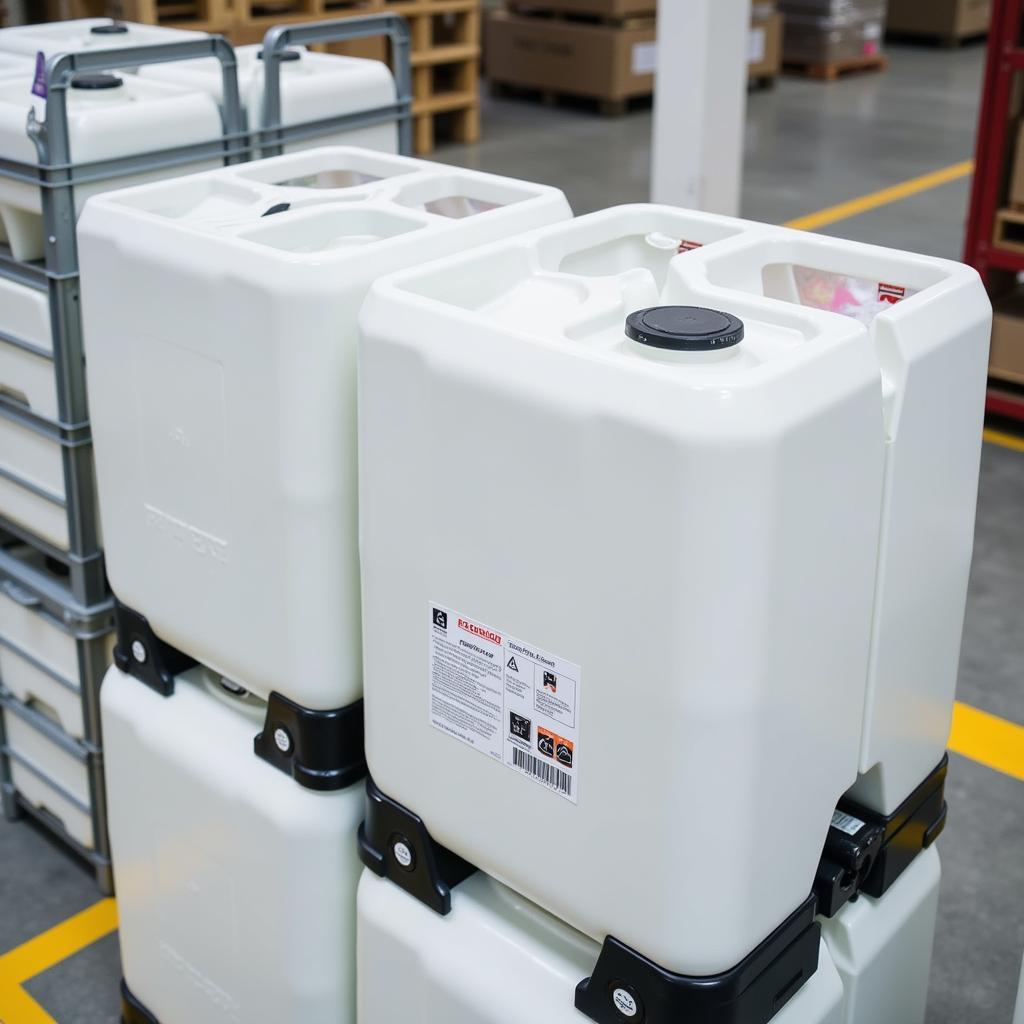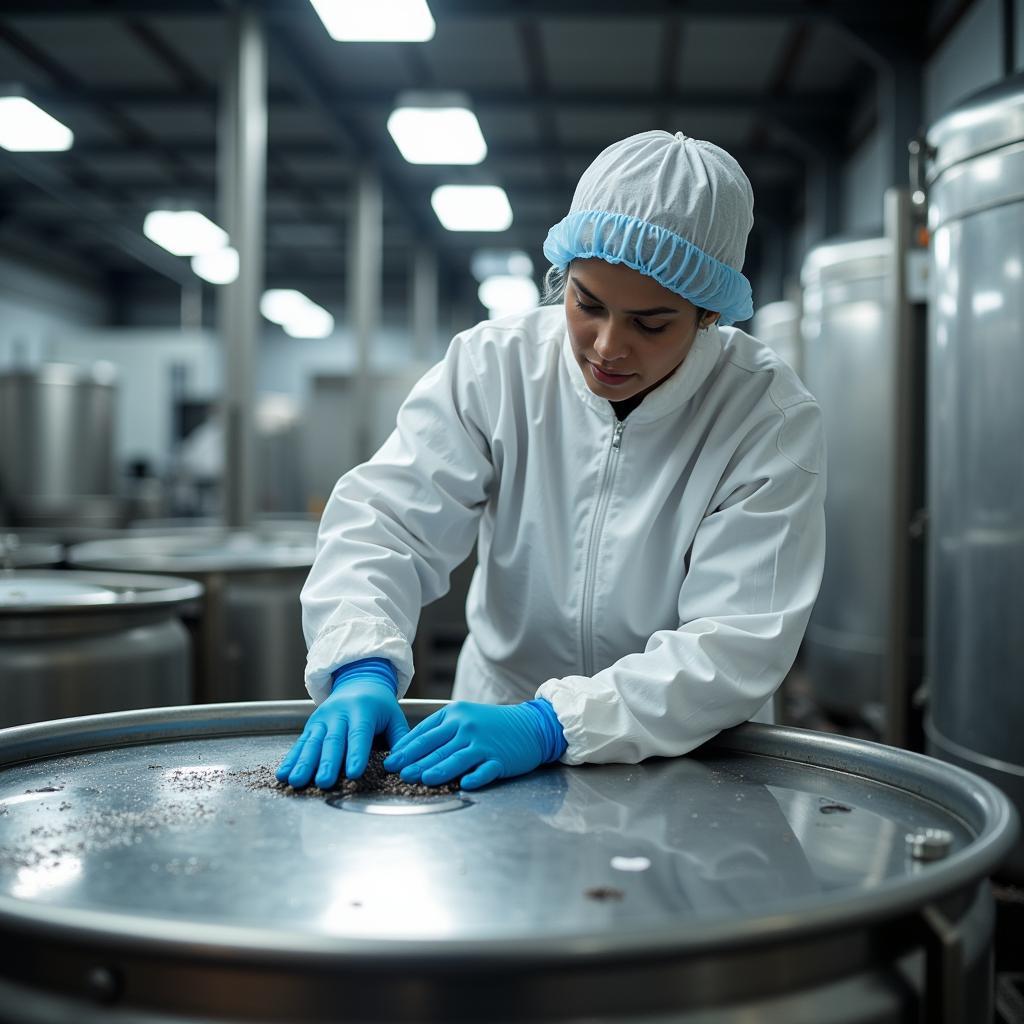Intermediate bulk containers, or IBCs as they’re more commonly known, have become a popular choice for storing and transporting a wide variety of goods. But did you know that they’re also a safe and efficient solution for food storage? That’s right, “Ibc Food” refers to the use of these robust containers to safely store and transport food products, ensuring freshness and quality every step of the way.
The Benefits of Using IBC Food Storage Solutions
Let’s delve into why IBCs are gaining traction in the food industry:
- Food-Grade Safety: Not all IBCs are created equal, and when it comes to food, safety is paramount. Look for containers specifically labeled as “food-grade.” These containers are made from materials that meet strict regulations, ensuring that they won’t leach harmful chemicals into your valuable ingredients.
- Durability & Hygiene: Constructed from tough, impact-resistant materials like high-density polyethylene (HDPE), food grade IBC totes are built to withstand the rigors of transportation and handling, reducing the risk of leaks or spills. Their smooth, non-porous surfaces are easy to clean and sanitize, preventing the growth of bacteria and maintaining the integrity of your food products.
- Versatility in Spades: From viscous liquids like honey and sauces to granular products like grains or powders, IBC food containers can accommodate a wide range of consistencies. This adaptability makes them a practical choice for various food businesses, from small-scale producers to large-scale manufacturers.
- Space Optimization: Efficient use of space is crucial in any storage facility, and IBCs excel in this area. Their stackable design maximizes vertical storage capacity, while their uniform shape allows for neat and organized arrangements, making the most of your precious floor space.
- Cost-Effective in the Long Run: While the initial investment for an IBC might seem higher than traditional storage methods, their long lifespan and reusability translate into significant cost savings over time.
 Food-Grade IBC Tote Storage
Food-Grade IBC Tote Storage
Choosing the Right IBC for Your Food Storage Needs
Navigating the world of IBCs can seem daunting, but with the right information, you can confidently select the perfect container for your specific needs. Here’s what to consider:
- Material Matters: As mentioned earlier, always opt for food-grade IBCs. These containers are typically made from HDPE, known for its strength, chemical resistance, and ability to be recycled.
- Capacity Considerations: IBCs come in various sizes, commonly ranging from 275 gallons to 330 gallons. Assess your storage volume requirements to determine the most suitable capacity for your operation.
- Design Features: Pay attention to design features that enhance usability and convenience. For instance, a pallet-mounted IBC offers ease of movement with a forklift, while a cage-protected IBC provides added protection during transport.
- Regulatory Compliance: Ensure that the IBCs you choose comply with relevant food safety regulations in your region. This step guarantees that your storage practices meet legal standards and maintain the quality of your food products.
Maintaining Your IBC Food Containers for Optimal Performance
Proper maintenance is key to extending the lifespan of your IBCs and ensuring the long-term safety of your food products. Here are some essential maintenance practices:
- Regular Cleaning and Sanitization: Thoroughly clean and sanitize your IBCs after each use, paying close attention to corners and crevices. Use food-safe cleaning agents and follow recommended sanitization protocols to prevent cross-contamination.
- Inspections Are a Must: Before each use, inspect your IBCs for any signs of damage, such as cracks, dents, or leaks. Promptly address any issues to prevent spills, contamination, or compromised food quality.
- Proper Storage When Not in Use: When not in use, store your empty IBCs in a clean, dry, and well-ventilated area. Protect them from direct sunlight and extreme temperatures, which can degrade the plastic over time.
 Cleaning Food-Grade IBC
Cleaning Food-Grade IBC
IBC Food: A Sustainable Choice for a Responsible Future
In an era where sustainability is paramount, IBC food storage aligns with eco-conscious practices:
- Reduced Packaging Waste: By using reusable IBCs, you’re significantly reducing reliance on single-use packaging materials, minimizing your environmental footprint.
- Recyclable Materials: Most food-grade IBCs are made from HDPE, a highly recyclable plastic. At the end of their service life, these containers can be recycled into new products, contributing to a circular economy.
- Efficient Transportation: The large volume capacity of IBCs allows for fewer trips during transportation, reducing fuel consumption and greenhouse gas emissions.
FAQs About IBC Food Storage
Q: Can I store any type of food in a food-grade IBC?
A: While food-grade IBCs are designed for a wide range of food products, it’s crucial to check the container’s specifications and compatibility with the specific food you intend to store. Consider factors like acidity, oil content, and potential reactions with the container material.
Q: How long can I store food in an IBC?
A: The storage duration depends on several factors, including the type of food, storage conditions, and the IBC’s condition. Always follow recommended storage guidelines for the specific food product and regularly inspect the container for any signs of degradation.
Q: Where can I purchase food-grade IBCs?
A: Reputable suppliers specializing in industrial packaging and containers offer a range of food-grade IBCs. Look for suppliers who understand the specific requirements of the food industry and can provide guidance on selecting the right containers for your needs. For instance, 2-gallon food containers are a great option for smaller storage needs.
Making Informed Decisions for Your Food Business
Choosing the right storage solutions is paramount for maintaining food quality, ensuring safety, and optimizing your operations. IBCs offer a versatile, durable, and sustainable option for businesses of all sizes.
 Food-Grade IBC – California Recycled
Food-Grade IBC – California Recycled
For those seeking reliable and high-quality food-grade IBCs, consider exploring the options available at Mina Cones Food. They offer a variety of food-grade IBC totes that meet the highest industry standards.
By understanding the benefits, selection criteria, and maintenance practices associated with IBC food storage, you can make informed decisions that contribute to the success and sustainability of your food business. If you need assistance, please contact us at Phone Number: +842437655121, Email: minacones@gmail.com or visit our address: 3PGH+8R9, ĐT70A, Trung Village, Bac Tu Liem, Hanoi, Vietnam. We are available 24/7.